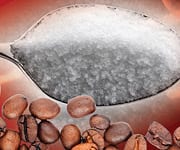The average American coffee drinker consumes about 3.1 cups of coffee a day,5 but extensive research has found that higher volumes - as much as 4 to 12 cups daily - can help prevent most major killers, including cardiovascular disease,6-8 cancer,9-11 diabetes,12-14 liver disease,15-17 and Alzheimer's disease.18-20
For instance, in case-controlled human studies, compared to coffee abstainers, those who drank the most coffee cut their risks of breast cancer by 57% and diabetes by 67%.10,21
In this article, you will learn about recent research into the benefits of coffee consumption, what's missing from most commercial coffee beans, and what people should do who are overly sensitive to coffee beverages
Diabetes Management
 |
Scientific studies have found that regular coffee consumption (with its chlorogenic acid content) lowers the risk of type 2 diabetes by up to 67%.21 This appears to result from reduced levels of blood glucose, increased insulin sensitivity, and decreased storage of both fat and carbohydrate.
In one of a number of studies, a 2009 meta-analysis in the Annals of Internal Medicine combined data on over 450,000 people and found that every additional cup per day of caffeinated or decaffeinated coffee lowered the risk of diabetes by 5 to 10%.12
Many epidemiological studies show that the risk of diabetes drops directly according to the amount of coffee consumed. For instance, scientists found that overall risk is reduced by:
- 1. 13% with one cup a day,24
- 2. 47% with 4 cups a day,24
- 3. 67% with 12 cups a day.21
Chlorogenic acid also lessens the hyperglycemic peak associated with carbohydrate ingestion.26 This results in a downturn in insulin activity, and a reduced accumulation of adipose (fat-storing) tissue.
Unidentified compounds in coffee, as well as caffeine itself, may be boosting the preventive effect of chlorogenic acid against diabetes. Preliminary studies suggest that these chemicals may lower carbohydrate storage by 35%27 and improve insulin sensitivity.28
Coffee was previously found to inhibit iron absorption.29 Later, in 2004, scientists found a direct link between reduced storage of iron in the body and a lower risk of diabetes type 2, independent of other risk factors
Cancer Risk Reduction
 |
For instance, at a time when prostate cancer is the second leading cause of cancer death among American men (after lung cancer),31 a promising study appeared in the June 8, 2011, issue of the Journal of the National Cancer Institute. The research team reported that men who drank over 6 cups of coffee a day had an 18% lower risk of prostate cancer - and a 40% lower risk of aggressive or lethal prostate cancer.9 This effect was noted for decaffeinated as well as caffeinated coffee - indicating that compounds other than caffeine are responsible for this preventive effect. Constituents in coffee seem to improve insulin levels and sensitivity,32 hypothesized to play a role in prostate cancer progression.33
With breast cancer ranked as the second leading cause of cancer death among American women (after lung cancer),34 potentially good news arrived recently in the form of a study finding that coffee consumption may help prevent a specific form of this disease. The May 14, 2011, issue of Breast Cancer Research reported that postmenopausal women who consumed 5 cups of coffee daily exhibited a 57% decrease in their risk of developing ER-negative (non-hormone-responsive) breast cancer, a form of cancer that is especially difficult to treat.10 This builds on an earlier study in which 2 or more cups of coffee per day was shown to delay the onset of breast cancer in women with a certain genetic type.35 Chlorogenic acid, caffeic acid, phytoestrogens, and caffeine - all found in coffee - are suspected of playing a major role.35
Colorectal cancer is the second most common cause of cancer-related deaths in the US overall (when the statistics for both sexes are combined).36 While colonoscopy screening is a useful tool for detecting cancers or pre-cancerous polyps, researchers have long hoped to find ways to prevent these cancers in the first place. The good news is that a large meta-analysis has reviewed the combined data from 24 previous studies and found an overall 30% lower incidence of colorectal cancer among those categorized as heavy coffee drinkers.37 This confirms the findings from several earlier studies.38-41
There is a 15% chance that patients who are diagnosed with an oral or pharyngeal cancer will be found to have another cancer somewhere in the same area of the body such as the larynx (voice box), esophagus, or lung.42 But early research suggests the promise of preventing these types of cancers from occurring. A case control study found that individuals who consumed more than three cups of coffee daily had a 40% lower risk of oral, pharyngeal, and esophageal cancers, compared to those who drank one cup of coffee or less each day.43 A second study made the same strong connection.44
For several decades, liver cancer has been on the rise among Americans.45 Liver cancer has become a leading cause of cancer deaths worldwide,45 due to higher rates in some other parts of the world. In recent years, however, studies have been accumulating that suggest a substantially reduced risk of this disease among coffee drinkers. In a 2005 study, for example, just one cup a day was associated with a 42% lower risk of liver cancer.46 A number of studies have reported similar conclusions.
No comments:
Post a Comment